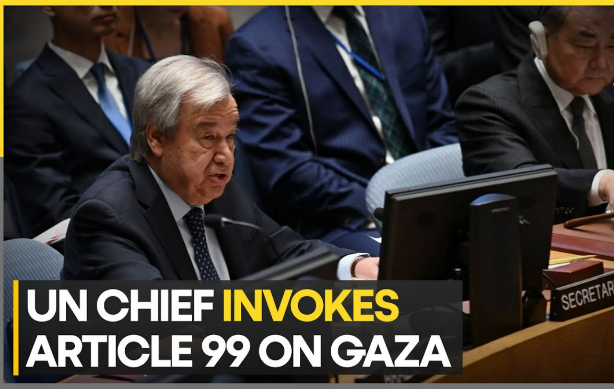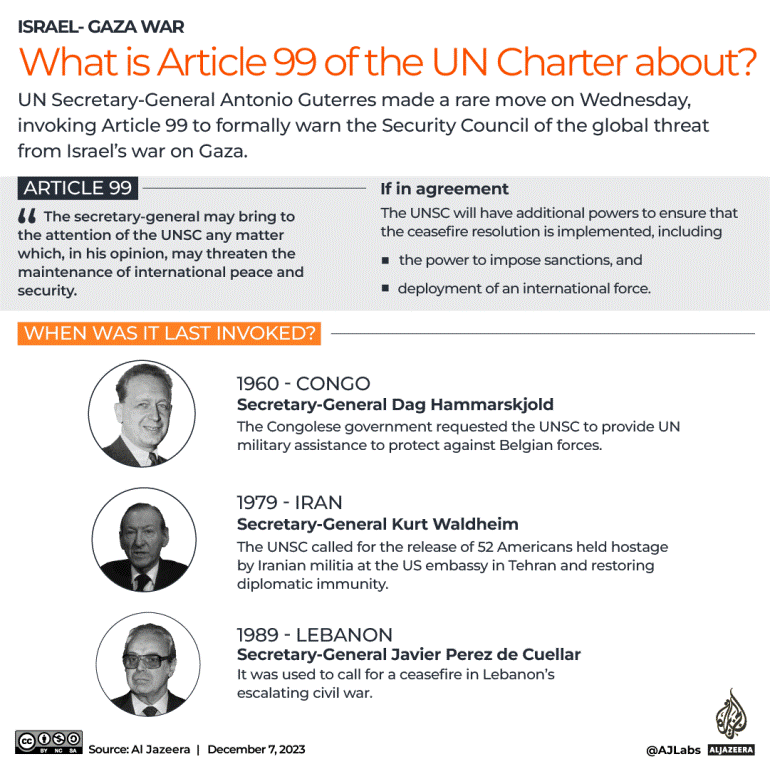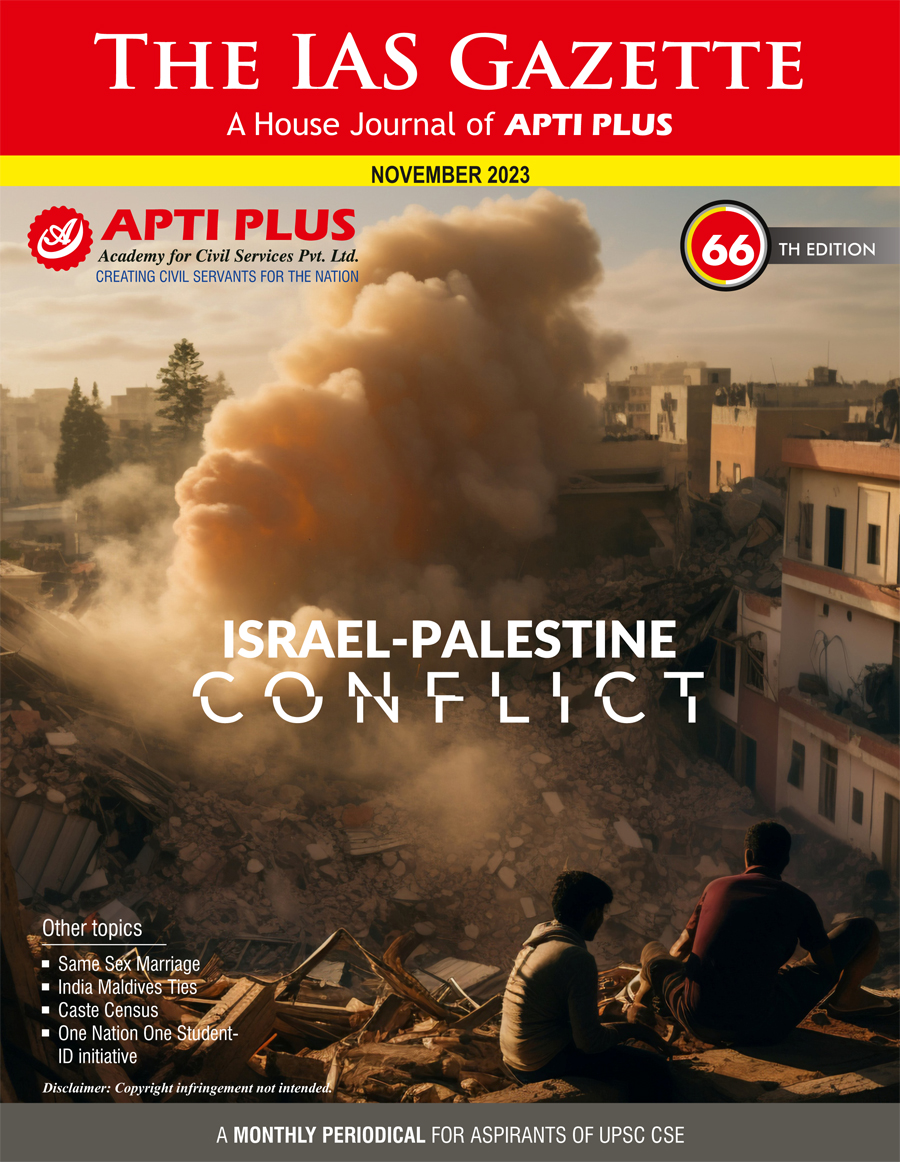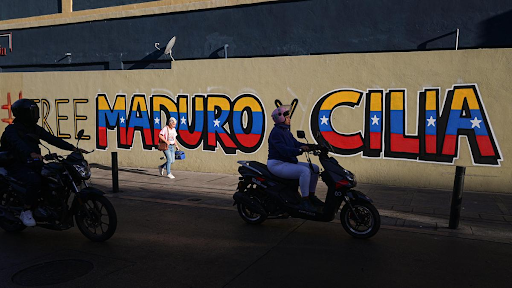Description

Disclaimer: Copyright infringement not intended.
Context
- Amid Israel’s ongoing military attacks on the Gaza Strip United Nations Secretary-General Antonio Guterres has invoked Article 99 of the UN Charter.
UN Charter
- The UN Charter is the founding document of the United Nations.
- Based on the powers conferred through it, the UN can take action on a wide variety of issues.
- The Charter is considered an international treaty, meaning UN Member States are “bound by it”. However, in practice, there is little that member countries can be forced to do.

What is Article 99?
- It’s a special power, and the only independent political tool given to the secretary-general in the UN Charter.
- It allows him to call a meeting of the Security Council on his initiative to issue warnings about new threats to international peace and security and matters that are not yet on the council’s agenda.
- In Article 99, the charter states, “the Secretary-General may bring to the attention of the Security Council any matter which in his opinion may threaten the maintenance of international peace and security”.
- Now Guterres will have the right to speak at the Security Council, without having to be invited to speak by a member state, as is usually the case.
- It is seen as a discretionary power.
- According to the UN, the President of the Security Council is under the obligation to call a meeting of the Council if the Secretary-General brings to the attention of the Council any matter under Article 99.
When has Article 99 been invoked in the past?
- The provision has been rarely invoked.
- Past examples include the upheaval in the Republic of the Congo in 1960 following the end of Belgium’s colonial rule and a complaint by Tunisia in 1961 against France’s naval and air forces launching an attack.

So, it’s only been invoked four times in the past — in the Congo (1960), East Pakistan (1971), Iran (1979) and Lebanon (1989).
- July 1960: Congo — Then Secretary-General Dag Hammarskjold requested an urgent meeting with the council on “a matter which, in my opinion, may threaten international peace and security”, after the Congolese government requested the UN provide military assistance to protect against Belgian forces.
- December 1971, East Pakistan — On Wednesday, UN Spokesperson Stephane Dujarric referred to the time when then Secretary-General U Thant cited Article 99 to seek the Security Council’s intervention in the war in what was then known as East Pakistan, and is now Bangladesh. It is unclear whether U Thant’s reference to Article 99 represented a full invocation of the rule.
- December 1979, Iran — Austrian diplomat Kurt Waldheim, as secretary-general in the late 1970s, used Article 99 on December 4, 1979 when 52 Americans were held hostage by Iranian fighters at the US Embassy in Tehran after the Islamic Revolution in Iran.
- August 1989, Lebanon — Secretary-General Javier Perez de Cuellar used it to call for a ceasefire in Lebanon’s escalating civil war.
- The article was initially designed as a preventative tool, a bit like a warning system. Its use was meant to deter conflicts from escalating, but as in the war on Gaza, the article has also been used after conflicts had already escalated.
- “The fact that this tool has not been used since 1989 does resonate diplomatically and symbolically here in New York,” Daniel Forti, a senior analyst on UN advocacy and research at the International Crisis Group, told Al Jazeera.
Has it brought peace before?
- The use of Article 99 has had mixed results in the past, though it has never really brought peace.
- That’s because the secretary-general’s intervention does not “fundamentally change the political calculation of the Security Council’s most powerful members”.
- In 1960, for instance, the invocation of the article led to the Security Council adopting Resolution 143, calling for Belgium to begin troop withdrawal.
- It also sent UN peacekeeping forces to facilitate this. But the Congolese war continued, Prime Minister Patrice Lumumba was assassinated, and the country’s crisis would deepen in the years that followed.
- The Security Council similarly called for the release of American hostages in 1979, and Waldheim was authorised to “take all appropriate measures” to make that happen. But the hostages were held for 444 days, with two killed. The rest were released only after the Algiers Accords were signed in 1981.
- The Security Council also called on all sides in Lebanon to work towards a ceasefire in 1989, after Article 99 was last used. But the conflict continued.
- In the case of the current conflict, the US has so far firmly opposed a ceasefire resolution at the Security Council, and there is little evidence that Washington’s position has changed.
How has Guterres invoked Article 99 this time?
- In his letter to the UNSC President, Guterres spoke of the “appalling human suffering, physical destruction and collective trauma across Israel and the Occupied Palestine Territory.”
- Guterres said that he has repeatedly condemned the October 7 Hamas attacks on Israel that led to the deaths of more than 1,200 people, and called for the release of more than 130 people still held captive.
- He added that since the start of Israel’s military operation, more than 15,000 have been killed, with nearly 40 per cent being children.
- The collapse of the healthcare system, difficulties in extending humanitarian relief, and issues of displacement have been pointed to – as a result of the “constant bombardment by the Israel Defense Forces”.
- Guterres urged the members of the Security Council to press to avert a humanitarian catastrophe.
- He appealed for a humanitarian ceasefire to be declared. This is urgent. The civilian population must be spared from greater harm.
- With a humanitarian ceasefire, the means of survival can be restored, and humanitarian assistance can be delivered in a safe and timely manner across the Gaza Strip.

Can Article 99 end the conflict?
- Considered the UN’s most powerful body, the 15-member Security Council is tasked with maintaining international peace and security. If it chooses to act on Guterres’s advice and adopt a ceasefire resolution then yes. It will have additional powers at its disposal to ensure the resolution is implemented, including the power to impose sanctions or authorize the deployment of an international force.
- But it doesn’t give Guterres any powers to force the Security Council to adopt a resolution.
- Also, to be adopted, a resolution needs at least nine votes in favor and no vetoes by the five permanent members – the United States, Russia, China, France or Britain.
- However, it is unlikely that the vote will see permanent members’ unanimous support.
- Also, because of the veto at the Security Council, the only way the Security Council can adopt a substantive resolution on this issue is for each of the five permanent members to choose not to veto it.
- China, Russia, the US, the UK, and France – hold this veto power.
- And the US and Britain have expressed support for Israel’s military actions since October 7.
|
PRACTICE QUESTION
Q. What is Article 99 of the UN Charter? What role has Article 99 played in the past to bring peace? Does Article 99 have the potential to end conflicts like that of Israel and Hamas?
|












